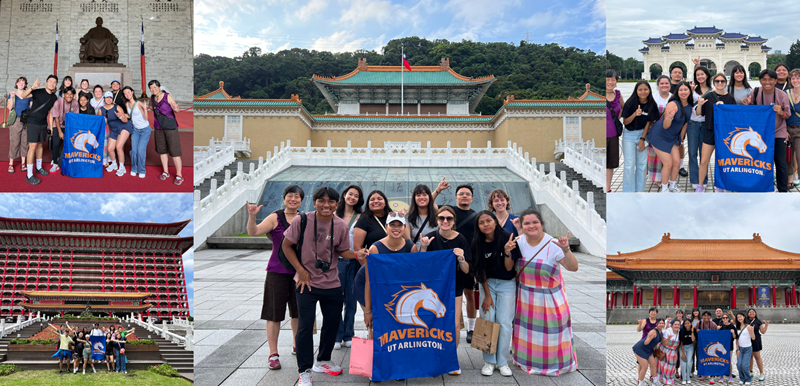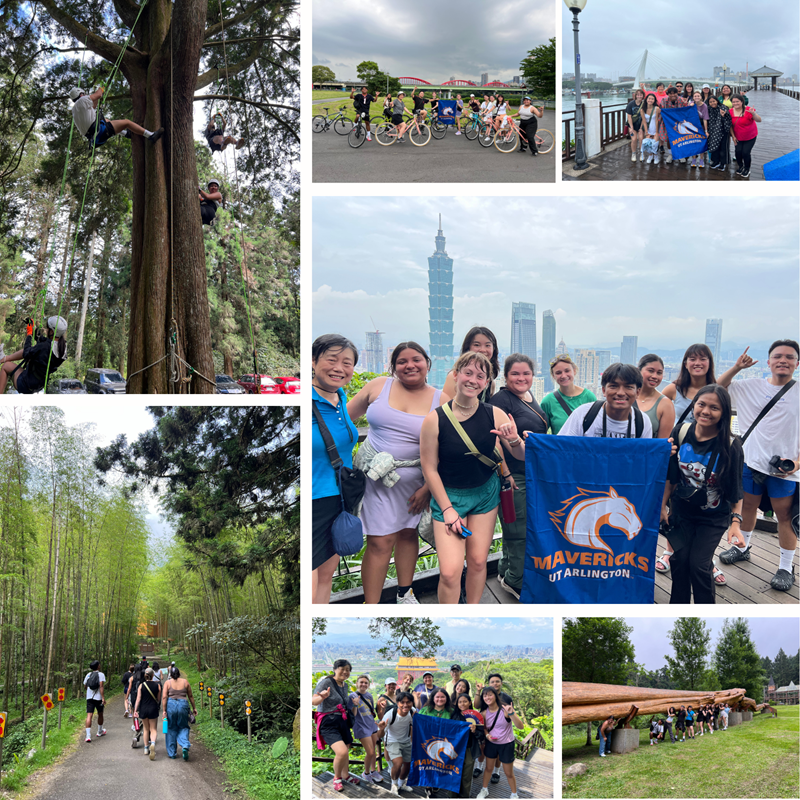Learning by Experiencing: Exploring Sustainable and Climate-Resilient Communities in Taiwan

Students enjoying famous landscapes in Taiwan.
Made possible by the Faculty-Led Study Abroad Program Development Grants, CAPPA Associate Professor Dr. Tongbin Qu led a group of students on a transformative two-week study abroad program in Taiwan this summer focused on sustainable and climate-resilient communities this summer. Through immersive experiences in both urban and rural settings, the program offered students an in-depth understanding of how sustainability is practiced in daily life, touching on economy, transportation, food, energy use, environmental planning, and social equity.
"Learning about sustainable practices in class is one thing, but living them is another," said Dr. Qu. "Only when students are in a different country and immersed in a new culture do they truly feel and understand the difference."
Students explored sustainable transportation firsthand by taking public transit daily and participating in group bike rides along the river in Taipei. They navigated the city using the metro system and bike-share programs, reinforcing lessons on accessibility and reducing car dependence. Dr. Qu noted that engaging in activities such as these, in addition to hiking in the mountains and exploring night markets, allowed students to understand how Taiwan's urban design promotes a healthier and more environmentally friendly way of living. "Public transit is not just about mobility, it's about building healthier communities," she explained.

Students enjoying activities around the city.
In the countryside, students visited indigenous communities and organic tea farms, gaining insight into rural sustainability practices. These experiences illuminated how economic development can work in harmony with environmental stewardship.
For students like Bailey Brewer, the study abroad program served as a decisive shift in perspective. "It broadened my perspectives on sustainable transportation and lifted my spirits knowing that change is being made and is possible for our futures." Similarly, Alexis Reyes entered the program with limited knowledge about Taiwan, but he also soon discovered the nation's visible dedication to environmental care. "I knew very little about Taiwan before I went on this trip, but after landing, it was immediately apparent that they deeply care about the environment. " The program broadened their worldview, highlighting how sustainability can be both a cultural value and a national priority.
The curriculum revolved around the 3Es of sustainability: environment, economy, and social equity. Students learned how Taiwan balances these interdependent factors. "You cannot have long-term economic growth by sacrificing the environment," Dr. Qu emphasized. "Taiwan shows how renewable energy, like solar and nuclear, is used responsibly to fuel development while preserving natural resources."
Social equity was a central theme to the program. Students observed how indigenous communities are supported through initiatives promoting organic farming and fair trade. They also noted how public behaviors, like lining up in subway stations or sorting food waste, demonstrate a communal respect for shared spaces and collective well-being.
While every activity received positive feedback, Dr. Qu said two stood out: the group's steep uphill hike on the first day, which offered a panoramic view of Taipei, and a scenic bike ride along the city's riverbanks that ends at an eco-friendly fish passage built into a dam.
"These weren't just beautiful experiences," she said. "They were teachable moments that showed how urban planning, biodiversity, and recreation can coexist."
Encouraged by student feedback and the success of this year's program, Dr. Qu hopes to expand the trip next year to three weeks, offering more academic credit and covering additional parts of the island, including the southern and eastern coastal regions.
"Students didn't want to leave," she said with a hopeful smile. "Some of them told me they now feel confident enough to return to Taiwan on their own. That's how I know the trip made a real impact."
With hands-on learning, cultural immersion, and a curriculum rooted in sustainability goals, Dr. Qu's study abroad program is shaping the next generation of urban planners and environmental leaders, one passport stamp at a time.
For more information about study abroad opportunities, check out our Study Abroad Programs page.